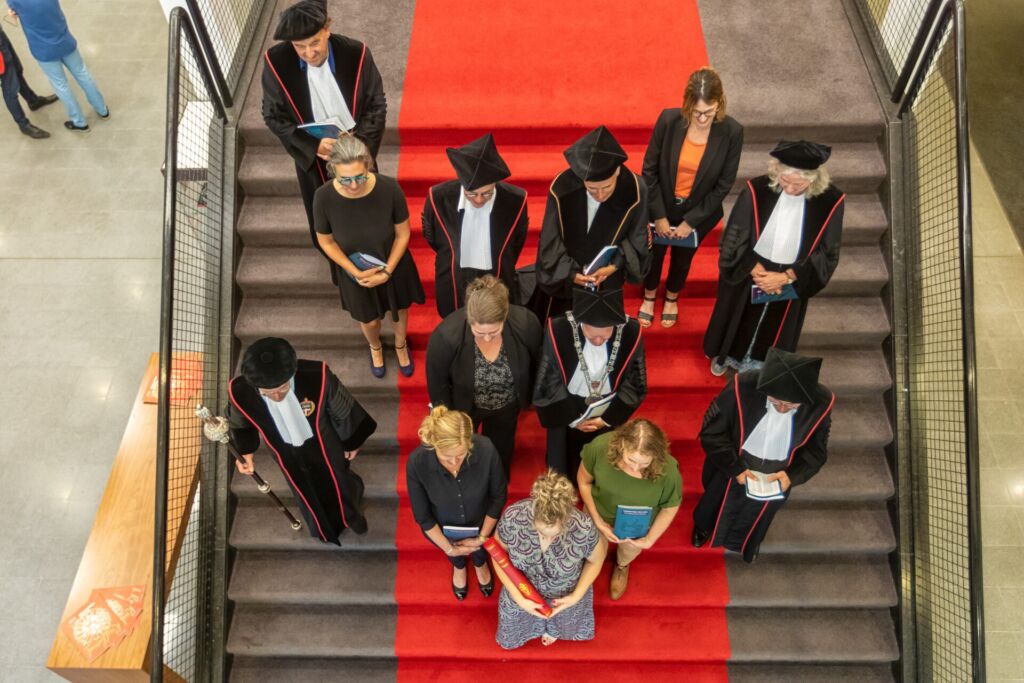Most professors wear their gowns with pride, but there is also discomfort: ‘Why am I allowed to wear one and someone else is not?’
-
 Illustratie: JeRoen Murré
Illustratie: JeRoen Murré
Few garments are as full of symbolism as the academic gown, the wearing of which is reserved for the very highest rank of academics. Many professors therefore wear it with pride. But is the academic gown still relevant today?
Amused surprise, some derision at times. The thoughts of friends and relatives during PhD ceremonies in Nijmegen’s auditorium are often written on their faces. The Registrar pounding his staff on the ground, shouting hora est! and a motley procession of professors in gowns moving towards the exit. It may be an everyday occurrence at a university, but for outsiders it remains a strange phenomenon, to say the least.
‘You could call it an old-fashioned puppet show,’ says Professor and oncological surgeon Hans de Wilt. ‘If you look at the gown with different eyes, of course it also looks strange, a kind of dress.’
But that ‘dress’ does have a function, he argues. The gown creates clarity about the role of the wearer, just as a white coat does for a doctor, or a uniform for a soldier. ‘A pilot could presumably also fly a plane just fine in jeans, but he still chooses to wear a suit.’
Cachet
Professors generally value the garment that goes with their academic title, according to a Vox survey completed by 181 Nijmegen professors. Many wear it with pride, but also with some feeling of discomfort or embarrassment. Some call wearing the gown an obligation, while others mostly report feelings of dignity, responsibility and humility.
What also often recurs in the responses is the gown’s limited comfort. It is ‘heavy’, ‘hot’ and ‘you have to be careful not to fall down the stairs’. Many professors hang their gown back in the closet as soon as possible after a ceremony.
Yet most would not want to do without it. 124 out of 181 professors (69%) are opposed to abolishing the gown at academic ceremonies. 23 professors would prefer to see the gown disappear, while 34 are neutral about it.
‘The gown also promotes a sense of community and belonging among academics’
But what is this value of the academic gown, other than the aforementioned ‘clarity’ about who is a professor and who is not? The words neutrality and independence are often mentioned. ‘We are showing that we are acting in the name of science and are therefore neutral,’ says one law professor. Another professor, also in law, says: ‘The university is not a course and diploma factory; it has a unique, independent position in society. This brings its own mores, traditions and matching appearance.’
Many professors see the gown as a symbol that gives ceremonies cachet. For neurosurgeon Jeroen Boogaarts, the gown is crucial as a symbol of ‘expertise, knowledge and tradition’. ‘The [wearing of the] gown represents reverence for education and science, and reinforces the solemn nature of academic ceremonies. The gown also promotes a sense of community and belonging among academics.’
The use of gowns in PhD defences reflects on the PhD candidate. The dress code and other rituals situate the PhD candidate in the ancient university tradition. Most relatives and friends appreciate it, and the PhD candidates often do too. ‘If you do away with gowns, you take away the power of this special event,’ says Ria Nijhuis, Professor Emeritus of Paramedical Sciences. Or as Professor of Human Rights Jasper Krommendijk puts it: ‘If you take away all the rites and traditions, what is left?’
Distance
The other side of the coin is that gowns very explicitly express hierarchy in universities. ‘On the one hand, the gown gives extra cachet and guests from outside academia always experience it as fun and special,’ writes Marcel Verbeek, Professor of Neurodegenerative Diseases. ‘On the other hand, there is something elitist and old-fashioned about it, which increases the distance between science and society.’
Anyone who innocently attends an academic ceremony and sees people walking around in gowns may think: these are the real scholars and those others are not. For an assistant or associate professor with years of accumulated expertise, that is not fun, to put it mildly.
This makes some professors extremely uncomfortable, like Professor of Statistics Jeanine Houwing-Duistermaat. She would prefer not to wear the gown at all, but as the only female professor at the Mathematics department, she feels it is her duty to represent women. ‘Otherwise, there will really only be men in gowns. And that is also not something I want.’
‘Why am I allowed to wear a gown while someone else is not?’
When Houwing-Duistermaat bought her Leiden gown some 15 years ago, she was still proud of it. That feeling increasingly ebbed away over the years. She would not buy another expensive gown now. ‘Do we really need to emphasise so strongly the difference between a full professor and an associate professor? We largely do the same work – we supervise PhD candidates, we serve on committees. So why am I allowed to wear a gown while someone else is not?’
Houwing-Duistermaat sees the gown as a relic of the past. ‘It is a symbol rooted in a time when men ruled the university. And that, unfortunately, is still largely the case today.’ The fact that female professors are also allowed to wear gowns does little to change this, she believes.
Moreover, according to the statistics professor, society has changed in recent decades, while the university is trying to hold on to old traditions. ‘What message does that convey?’ She believes this only widens the gap between university and society.
Everyone a professor
Houwing-Duistermaat is not alone in her discomfort. The Young Academy, for example, launched a campaign in 2023 entitled Everyone a Professor! The national collective of young academics points out that assistant and associate professors largely have the same duties as full professors, but not the same rights. They are not allowed to wear a gown, award a PhD, or use the title of professor, as is common in Anglo-Saxon countries.
There have been changes in this respect in recent years, however. Since 2017, assistant and associate professors can be granted the ius promovendi: the right to award a doctoral title to a PhD candidate. The idea is that since assistant and associate professors often do the lion’s share of the supervision work, they should also be given credit for it.
At Radboud University, there are substantial differences in how faculties are implementing this, as apparent from a survey conducted earlier this year by the Radboud Young Academy. At the faculties of Science and Medical Sciences, approximately 40% of associate professors have been granted the ius promovendi. At the Faculties of Arts and Social Sciences and the Nijmegen School of Management, this figure is only around 20%.
Other universities, such as Delft, Maastricht and Groningen, are far more forthcoming with granting the ius promovendi, as apparent from a survey commissioned by the ministry two years ago. The Radboud Young Academy therefore pleads for Nijmegen to catch up and grant all associate professors (UHD) who have successfully supervised a number of PhD defences the ius promovendi. Radboud University is considering their proposal.
Seeming or real equality
Another, more symbolic measure has already been in place since this academic year. Not only full professors, but also assistant and associate professors who are members of the doctoral examination board are now allowed to wear a gown during a PhD defence. In this way, the university wants to express equality within a doctoral examination board.
‘At a ceremony like this, it is nice if everyone wears a gown,’ says Lotte Jensen, Professor of Dutch Literary and Cultural History. ‘It creates a sense of equality. It makes the PhD ceremony even more festive. And it is also good to eliminate the distinction between professors and non-professors in these ceremonies. Everyone who asks a question wears a gown.’
Like Jensen, almost half (48%) of Nijmegen professors are positive about this change. 27% of professors believe that wearing the gown should be reserved for full professors. A quarter of respondents are neutral.
‘It would be better if no one wore a gown’
Professor Hans de Wilt has a different take on this than Jensen. He thinks it is a nonsensical measure. ‘During inaugural lectures and at the opening of the Academic Year, only full professors get to wear a gown, and now suddenly it is different at PhD defences. I find that strange. It creates a semblance of equality,’ he says. ‘But the symbolism of the professor is lost in the process.’
De Wilt is not the only professor to feel this way. According to his colleague Pim Assendelft (Prevention in Healthcare), a professor has a certain role, which is expressed by wearing a gown. If others are also allowed to wear a gown, the gown becomes little more than a costume.

Finally, there are also professors who oppose extending the right to wear the gown, but based on a very different argument. ‘For me it is very simple: professors have a gown, non-professors do not,’ says Jacqueline de Graaf, Professor at Radboudumc Health Academy.
If the gown is no longer reserved for professors, the university would be better off abolishing this traditional attire altogether, De Graaf believes. ‘Equality is not reflected in whether or not we wear a gown, but in how we treat each other, how we see each other, how we work together. My motto is: Away with hierarchy, and on to vital teamwork with a human dimension and in dialogue with each other!’
Or, as Professor of Psychology Roos Vonk puts it: ‘It would be better if no one wore a gown. But if gowns must be worn, let the professors suffer alone. Otherwise there will soon be even more of those beastly things!’




